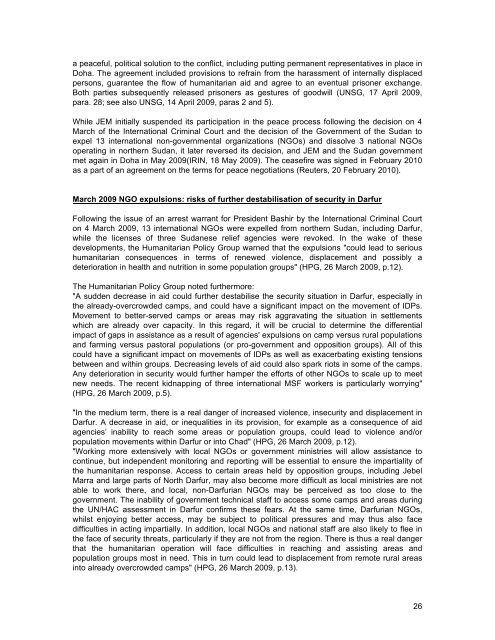SUDAN: Durable solutions elusive as southern IDPs return and ...
SUDAN: Durable solutions elusive as southern IDPs return and ...
SUDAN: Durable solutions elusive as southern IDPs return and ...
Create successful ePaper yourself
Turn your PDF publications into a flip-book with our unique Google optimized e-Paper software.
a peaceful, political solution to the conflict, including putting permanent representatives in place in<br />
Doha. The agreement included provisions to refrain from the har<strong>as</strong>sment of internally displaced<br />
persons, guarantee the flow of humanitarian aid <strong>and</strong> agree to an eventual prisoner exchange.<br />
Both parties subsequently rele<strong>as</strong>ed prisoners <strong>as</strong> gestures of goodwill (UNSG, 17 April 2009,<br />
para. 28; see also UNSG, 14 April 2009, par<strong>as</strong> 2 <strong>and</strong> 5).<br />
While JEM initially suspended its participation in the peace process following the decision on 4<br />
March of the International Criminal Court <strong>and</strong> the decision of the Government of the Sudan to<br />
expel 13 international non-governmental organizations (NGOs) <strong>and</strong> dissolve 3 national NGOs<br />
operating in northern Sudan, it later reversed its decision, <strong>and</strong> JEM <strong>and</strong> the Sudan government<br />
met again in Doha in May 2009(IRIN, 18 May 2009). The ce<strong>as</strong>efire w<strong>as</strong> signed in February 2010<br />
<strong>as</strong> a part of an agreement on the terms for peace negotiations (Reuters, 20 February 2010).<br />
March 2009 NGO expulsions: risks of further destabilisation of security in Darfur<br />
Following the issue of an arrest warrant for President B<strong>as</strong>hir by the International Criminal Court<br />
on 4 March 2009, 13 international NGOs were expelled from northern Sudan, including Darfur,<br />
while the licenses of three Sudanese relief agencies were revoked. In the wake of these<br />
developments, the Humanitarian Policy Group warned that the expulsions "could lead to serious<br />
humanitarian consequences in terms of renewed violence, displacement <strong>and</strong> possibly a<br />
deterioration in health <strong>and</strong> nutrition in some population groups" (HPG, 26 March 2009, p.12).<br />
The Humanitarian Policy Group noted furthermore:<br />
"A sudden decre<strong>as</strong>e in aid could further destabilise the security situation in Darfur, especially in<br />
the already-overcrowded camps, <strong>and</strong> could have a significant impact on the movement of <strong>IDPs</strong>.<br />
Movement to better-served camps or are<strong>as</strong> may risk aggravating the situation in settlements<br />
which are already over capacity. In this regard, it will be crucial to determine the differential<br />
impact of gaps in <strong>as</strong>sistance <strong>as</strong> a result of agencies' expulsions on camp versus rural populations<br />
<strong>and</strong> farming versus p<strong>as</strong>toral populations (or pro-government <strong>and</strong> opposition groups). All of this<br />
could have a significant impact on movements of <strong>IDPs</strong> <strong>as</strong> well <strong>as</strong> exacerbating existing tensions<br />
between <strong>and</strong> within groups. Decre<strong>as</strong>ing levels of aid could also spark riots in some of the camps.<br />
Any deterioration in security would further hamper the efforts of other NGOs to scale up to meet<br />
new needs. The recent kidnapping of three international MSF workers is particularly worrying"<br />
(HPG, 26 March 2009, p.5).<br />
"In the medium term, there is a real danger of incre<strong>as</strong>ed violence, insecurity <strong>and</strong> displacement in<br />
Darfur. A decre<strong>as</strong>e in aid, or inequalities in its provision, for example <strong>as</strong> a consequence of aid<br />
agencies’ inability to reach some are<strong>as</strong> or population groups, could lead to violence <strong>and</strong>/or<br />
population movements within Darfur or into Chad" (HPG, 26 March 2009, p.12).<br />
"Working more extensively with local NGOs or government ministries will allow <strong>as</strong>sistance to<br />
continue, but independent monitoring <strong>and</strong> reporting will be essential to ensure the impartiality of<br />
the humanitarian response. Access to certain are<strong>as</strong> held by opposition groups, including Jebel<br />
Marra <strong>and</strong> large parts of North Darfur, may also become more difficult <strong>as</strong> local ministries are not<br />
able to work there, <strong>and</strong> local, non-Darfurian NGOs may be perceived <strong>as</strong> too close to the<br />
government. The inability of government technical staff to access some camps <strong>and</strong> are<strong>as</strong> during<br />
the UN/HAC <strong>as</strong>sessment in Darfur confirms these fears. At the same time, Darfurian NGOs,<br />
whilst enjoying better access, may be subject to political pressures <strong>and</strong> may thus also face<br />
difficulties in acting impartially. In addition, local NGOs <strong>and</strong> national staff are also likely to flee in<br />
the face of security threats, particularly if they are not from the region. There is thus a real danger<br />
that the humanitarian operation will face difficulties in reaching <strong>and</strong> <strong>as</strong>sisting are<strong>as</strong> <strong>and</strong><br />
population groups most in need. This in turn could lead to displacement from remote rural are<strong>as</strong><br />
into already overcrowded camps" (HPG, 26 March 2009, p.13).<br />
26
















